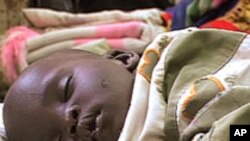<!-- IMAGE -->
Researchers behind the world's leading malaria vaccine candidate announced a major clinical trial involving thousands of children in seven African countries is well underway and on schedule. Top experts are converging in Nairobi from around the globe this week to attend the largest malaria conference in four years.
The vaccine, known as RTS-S, is the first malaria vaccine to ever reach Phase III testing. RTS-S is designed primarily to fight malaria in Africa, where 91 percent of children killed by the parasite are found.
The critical vaccine trial is expected to enroll up to 16,000 African children, 5,000 of which have already been recruited.
Spreading the testing across a variety of sub-Saharan nations was necessary in order to ensure a diversity of malaria breeding grounds were represented. In some areas malaria is a seasonal threat, whereas in others transmission can happen year-round.
Under a best case scenario, the researchers say the vaccine could be introduced into the market in as little as three years, although more realistically the process will take longer. Research first began in Belgium two decades ago, with initial testing in the United States starting during the mid-1990's.
The British pharmaceutical company behind the malaria vaccine, GlaxoSmithKline, said last week that it was committed to keeping the drug affordable should it reach the market.
Nairobi is host this week to the 5th Multilateral Initiative on Malaria Pan-African Conference, which was last held in 2005.
More than 800,000 people die each year from malaria, most of its victims having not yet reached the age of five.
Dr. Wen Kilama, a long-time malaria researcher and one of the conference organizers, says some African countries have made significant progress in the fight against malaria, including Eritrea, Zambia, and Ethiopia. But Kilama says many other states in the region are still losing the malaria battle. He places the blame for this discrepancy on the shoulders of the failing nations' governments.
"It is good governance; it is political will; it is the commitment - because financing to me is not as big a problem as it used to be. So it is putting their act together and getting the work done," said Dr. Kilama.
He also cautions against treating the RTS-S vaccine as panacea solution, saying that most likely more than one vaccine would be necessary to completely finish the fight against the parasite.
An additional study presented at the conference concludes that mosquitos are shifting their feeding times to earlier in the evenings in order to adapt to the widespread use of malaria bed nets in at-risk areas. The researchers urge combining use of the bed nets with mosquito repellants for full protection.




